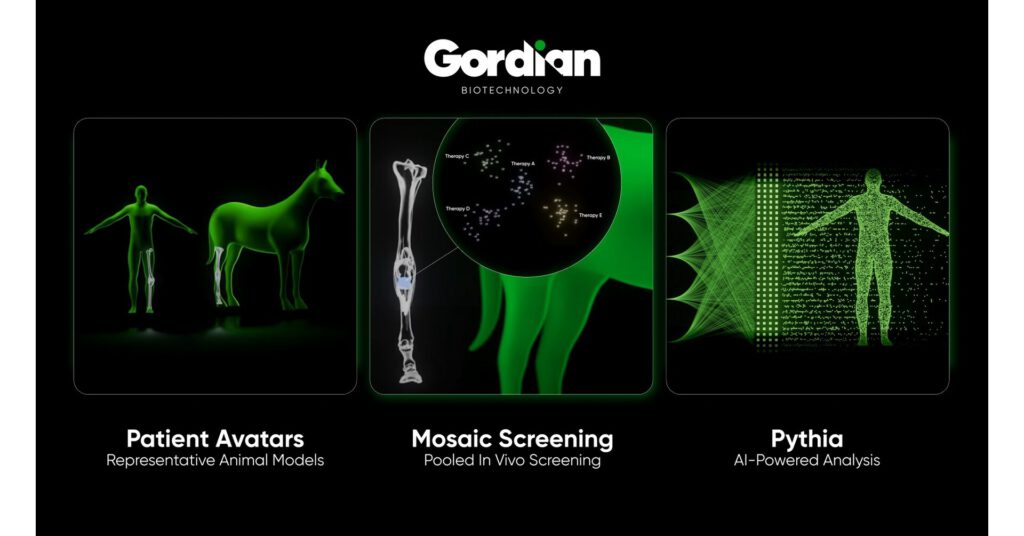Gordian’s osteoarthritis (OA) program has screened hundreds of treatments in horses with naturally developing OA and advanced dozens of treatments into human ex vivo validation studies. Results from these ex vivo studies matched screen predictions with 80% accuracy, with several hits progressing into additional testing and optimization. Gordian presented these findings last week at the Osteoarthritis Research Society (OARSI) International Conference.
In an early development proof-of-concept study, Gordian introduced a pooled library of 50 gene therapies into a mouse model of metabolically associated steatohepatitis (MASH). The therapies were evaluated using the company’s proprietary in vivo screening platform and successfully replicated 13 of 16 clinical outcomes for targets with existing clinical data.
Gordian has currently completed in vivo screening of thousands of novel single and multi-targeted therapies across four indications in highly representative animal models across multiple species.
“Gordian leverages recent advances in single-cell sequencing and gene therapy to discover and predict which drugs will work in ways that were unthinkable just five years ago,” said co-founder and CEO Francisco LePort. “Our ultimate goal is to help people wake up each day more capable than they were the day before.”
The first and only platform of its kind
In vivo screening enables Gordian to conduct the equivalent of hundreds of preclinical experiments in just a few months at a fraction of the cost of traditional preclinical research, providing a vast amount of in vivo data early in the discovery process in otherwise unavailable animal models, ensuring only the most effective therapeutics advance into development and clinical trials.
The Gordian platform consists of three unique components working together:
Patient Avatars™ are animal models that are biologically closer to human patients than typically used animal models, such as horses for OA or monkeys for MASH. The small number of animals required for screening allows Gordian to use large or sophisticated animal models that are not practical for large-scale preclinical studies. These animal models are often naturally diseased and, like humans, suffer from other conditions associated with biological aging. Mosaic Screening™ is a pooled in vivo screen that tests hundreds of treatments simultaneously in one diseased animal (the Patient Avatar). Diseased tissue becomes a “mosaic” where different cells receive different barcoded treatments. The treatments are introduced at low doses so that each damaged cell is separated by diseased tissue that is not damaged by any treatment, minimizing interactions between treatments. Each of these cells is sequenced to reveal the effect of each treatment in the full in vivo context of the disease. Pythia™ is an analytical method that uses artificial intelligence to interpret single-cell data from hundreds of cell experiments to measure the in vivo effect of each treatment. By analyzing this data alongside existing human pathology data, Gordian will determine which treatments are most likely to be successful in preclinical development and clinical trials.
“The most significant unmet medical needs are the consequences of aging, due to the complexity of the aging body, which often suffers from multiple co-morbidities at once, making research and development particularly challenging and expensive,” said Martin Bolch Jensen, co-founder and chief scientific officer at Gordian. “Gordian is creating a future where age-related diseases are treated and cured as effectively as infectious diseases are today.”
Ageing is the greatest risk factor for humans and the most expensive, yet research funding is scarce.
“Age-related diseases are incredibly complex, and live animals, ideally animals that age and naturally develop the disease, are the only experimental system that can capture this complexity,” said Laura Deming, partner at The Longevity Fund and investor in Gordian. “Our ability to understand these diseases is limited by the speed at which we can run tests in these living systems. Scaling that speed over 100-fold is really exciting and a giant leap towards treating age-related diseases.”
Gordian’s current focus indications include heart failure with preserved ejection fraction and pulmonary fibrosis, in addition to MASH and OA. The platform is capable of discovering therapies for a number of complex diseases. The company aims to partner with pharmaceutical companies to develop drugs and bring therapeutics into the clinic in-house.
LePort and Borch-Jensen studied and worked in different scientific fields in different parts of the world before their shared interest in longevity entrepreneurship brought them together in early 2018, and they founded Gordian in October of that year.
Follow Gordian on LinkedIn X For more information, visit www.gordian.bio.
Photos and video can be found at https://gordian.bio/media-assets
Media Contact
[email protected]
About Gordian Biotechnology
Founded in 2018 and headquartered in San Francisco, Gordian is an in vivo drug discovery and development company with a mission to treat age-related diseases. Named for solving intractable problems by changing the rules, the company has developed an innovative in vivo screening platform that tests thousands of gene therapies and predicts clinical outcomes with unprecedented accuracy and efficiency. The Gordian platform consists of three unique components that work together to enhance predictive power: Mosaic Screening is Gordian’s pooled in vivo screening method, Patient Avatars are animals that best represent humans, and Pythia is an analytical method that combines Gordian screening data with existing human data and uses machine learning to maximize predictive power. The company is funded by world-renowned investors including The Longevity Fund, Athos Service GmbH, Gigafund, Founders Fund, and former Novartis CEO Thomas Ebeling. Gordian: Creating Time.
SOURCE Gordian Biotechnology

